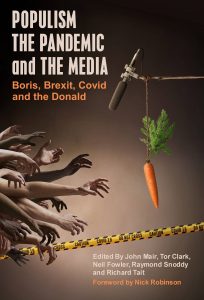Citizen Writes
Research hot topics
Thirteen is an unlucky number for UK Prime Ministers – will it prove so for Boris Johnson?
17/12/2021
By Tor Clark, Associate Professor in Journalism, University of Leicester, UK
Christmas 2021 couldn’t come soon enough for embattled Prime Minister Boris Johnson as he tried to put distance and festive cheer between himself and the worst crisis of his leadership with two huge political disasters in a week.
He hadn’t put the ‘partygate’ scandal behind him when he suffered a backbench rebellion of 100 of his own MPs then lost the rock solid Conservative seat of North Shropshire in a byelection, which itself had been prompted by sleaze.
All of which, after nearly a dozen years of Tory rule, should get us thinking of the longevity not necessarily of political leaders – who mostly don’t last very long – but of political parties in government in recent history.
Analysis of recent UK electoral history reveals, unsurprisingly perhaps, that 13 is a very unlucky number for Prime Ministers, with several governing parties suffering defeat or near defeat after just over a dozen years – and the current Conservative government potentially on course to suffer the same fate, whoever leads it.
These observations are gathered from 33 years of political journalism and a lifetime’s interest in political history. Having started working in professional journalism in 1988 and having covered eight general elections, I realised at the start of this year I had covered UK politics in five different decades. The troubling revelation led me to wonder what lessons might be learned from coverage of politics, but also more widely from political history, and how it might apply to the present occupant of No 10.
The result was a TED-style talk at the University of Leicester’s centenary celebrations in October, entitled Political Cycles: Reflections from covering politics in five decades. The outcome is a theory of political/electoral fatigue which has built up over that period and which looks relevant to the current Conservative administration.
Looking back in UK political history we can see clear patterns or cycles.
The first post-war Conversative government of Churchill, Eden, Macmillan and Douglas Hume 1951-1964 lasted 13 years. It ran out of ideas, was engulfed in scandal and was succeeded by Wilson’s Labour government, which went on to define the 1960s.
There followed a period of alternating power between Labour and the Conservatives in the 1970s, which led commentators to wonder if Britain was becoming ‘ungovernable’ such was the regularity of the handing over of the keys to No 10.
But in 1979 along came Margaret Thatcher who ruled confidently for 11 years before being knifed by her party in 1990 and succeeded by John Major. He went to the polls in 1992, 13 years after his party had first taken power and was expected by the polls to lose but bucked this unlucky trend with a narrow victory over Neil Kinnock’s (old) Labour, to secure another five unexpected years in office.
But the political fatigue and perhaps arrogance (remember the Poll Tax?) Mrs Thatcher’s administration had suffered immediately before her removal, returned to haunt Major’s administration, when a lack of fresh policy ideas and an avalanche of sleaze combined to see him ousted spectacularly by Tony Blair’s New Labour landslide in 1997.
Blair’s government seemed to define 90s Cool Britannia – though he was only in power for three years of that decade – as his government pushed through landmark policies such as the national minimum wage and expansion of university places.
Blair sensibly, and rarely for a PM, decided the time of his own departure and ushered in the impatient Gordon Brown in 2007, whose administration was dominated by the impact of the global financial crisis of 2008. He saw out the full term to 2010 but, again, with his government looking tired and short on policy ideas, was defeated by David Cameron’s Conservatives, after – you guessed it – 13 years.
A lot has happened since Cameron took power in the Conservative-Liberal Democrat Coalition of 2010-2015, and two PMs have followed him. Of course because of the importance of the binary issue of Brexit and the way the UK electoral system works, Johnson secured a big majority just two years’ ago in the 2019 General Election.

His position should have been secure after his promotion of Brexit and charismatic leadership delivered such a big majority for his party, but in the wake of fresh sleaze, scandal, accusations of persistent lying and a general air of arrogance about the whole administration, he suffered a huge Tory backbench rebellion on December 14 and electoral humiliation losing the North Shropshire byelection just two days later.
This should not be happening so early into the term of Johnson’s big majority government, but does the fact it is display once again a kind of political and electoral fatigue with a long-serving party in government?
If Boris Johnson survives his multiple pre-Christmas crises and is tempted to try to ‘cut and run’ early to the polls to preserve some of his 2019 election majority he may see how he gets through the coming year and go to the country again in 2023 – after 13 years of Conservative-led government. How might he fare then?
It’s not really the unlucky number which matters here, but the principle that after this kind of period in power every government stops being able to persuade voters it has much to offer.
Recent events will test that theory and Johnson may not survive long enough to find out personally, but don’t bank on the Conservative Party being able to beat historical precedent when the time comes, especially as the legacy of Brexit and Red Wall enthusiasm wanes and the Labour Party finally assembles a credible front bench, possibly with some polices to follow.
Boris Johnson has been a very lucky politician so far, but even a lucky PM cannot always buck the cycles of political history.